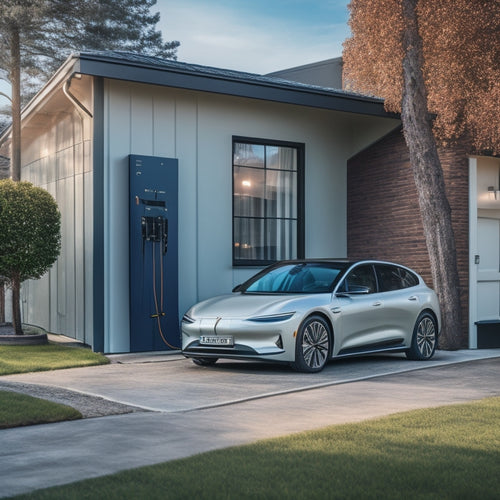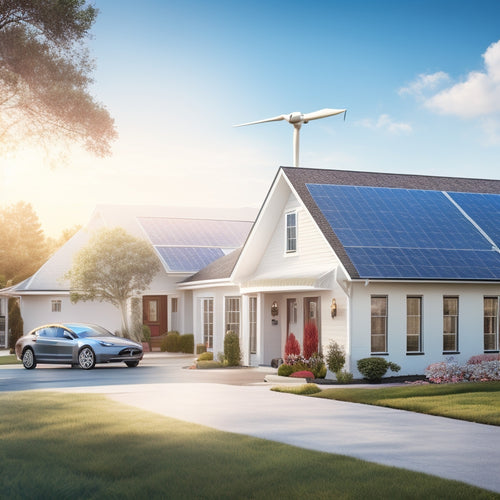
Mistakes to Avoid in Home Solar Panel Installation
Share
When installing solar panels, you'll want to avoid common mistakes that can lead to reduced energy output, safety hazards, and financial losses. Neglecting a thorough roof assessment can result in costly repairs or even roof collapse. Incorrect panel angles and insufficient energy storage can reduce your ROI. Poor wiring and connections can cause overheating and safety issues, while incompatible inverters can waste energy. Ignoring local building codes, failing to monitor performance, and skipping maintenance can lead to legal and technical complications. By being aware of these mistakes, you can guarantee a successful installation that meets your renewable energy goals - and there's more to learn about getting it right.
Key Takeaways
- Inadequate roof assessment can lead to costly repairs or roof collapse, so professional installers must conduct thorough evaluations.
- Incorrect solar panel angle adjustments can reduce energy output, so ideal tilt and seasonal adjustments are necessary for maximum ROI.
- Insufficient energy storage capacity can result in wasted energy and reduced system efficiency, so well-sized storage systems are essential.
- Poor wiring and connections can cause safety hazards and reduced efficiency, so qualified electricians should handle installations.
- Ignoring local building codes and regulations can lead to costly legal and installation complications, so familiarity with permitting processes is crucial.
Inadequate Roof Assessment
When you're considering solar panels for your home, your roof becomes a vital component of the installation process. A thorough roof assessment is necessary to guarantee a successful and efficient solar panel installation.
You must evaluate the roof material selection, as not all materials are suitable for solar panels. For instance, asphalt shingles are a popular choice, but clay or slate tiles may require additional structural support.
A structural integrity evaluation is also essential to determine if your roof can support the weight of the solar panels. You'll need to assess the roof's age, condition, and existing structural components, such as trusses and rafters. Failure to do so can lead to costly repairs or even roof collapse.
A professional solar installer will conduct a thorough roof assessment to identify potential issues and recommend necessary repairs or upgrades before installing your solar panels. By doing so, you'll guarantee a safe and efficient solar panel installation that meets your energy needs.
Incorrect Panel Angle
Adjusting solar panel angle is crucial for maximizing energy output, and getting it wrong can greatly impact your return on investment.
You'll want to confirm your panels are installed at the ideal tilt, which varies depending on your location and the time of year. A general rule of thumb is to tilt your panels at an angle equal to your latitude, but this can be adjusted based on your specific climate and energy needs.
Failing to make seasonal adjustments can also reduce your energy output. During the summer months, the sun is higher in the sky, so you'll want to adjust your panels to a steeper angle to capture more energy.
In the winter, the sun is lower, so a shallower angle is more effective. You can either adjust your panels manually or invest in a tracking system that automatically fine-tunes the angle for maximum energy production.
Insufficient Energy Storage
Your solar panel system's energy storage capacity is a critical component that can make or break your renewable energy goals. Insufficient energy storage can lead to wasted energy, reduced energy efficiency, and a shorter system lifespan.
You must consider the right battery types and storage capacity to guarantee your system can store excess energy generated during the day for use during the night or on cloudy days.
When selecting a battery, consider its charging cycles, depth of discharge, and compatibility with your solar technology. A well-sized energy storage system can provide backup power during grid outages, reducing your reliance on the grid connection.
Additionally, it can help you maximize renewable incentives by storing excess energy generated during peak production hours.
Underestimating installation costs and overlooking the importance of energy storage can be a costly mistake. A properly sized energy storage system can pay for itself through reduced energy bills and increased energy independence.
Don't compromise on your renewable energy goals; invest in a reliable energy storage system that meets your needs.
Poor Wiring and Connections
As you focus on maximizing your solar panel system's energy storage capacity, it's equally important to guarantee the electrical infrastructure can support it. This means making certain that your wiring and connections are up to par. Poor wiring and connections can lead to safety hazards, reduced system efficiency, and even complete system failure.
When it comes to wiring safety, you need to make sure that your wires are rated for the voltage and current output of your solar panel system. Using undersized or damaged wires can cause overheating, arcing, and even electrical fires.
Additionally, you should verify that your connections are secure and meet the required connection quality standards. Loose or corroded connections can lead to voltage drops, resistance, and heat buildup, reducing your system's overall performance.
To avoid these issues, it's essential to work with a qualified electrician who's experience with solar panel installations. They'll confirm that your wiring and connections meet the necessary safety standards and are designed to support your system's energy output.
Incompatible Inverter Choice
When selecting an inverter for your home solar panel installation, you'll need to make certain it can handle the capacity of your system.
If you choose an inverter that's too small, it won't be able to convert all the energy your panels produce, resulting in lost power and revenue.
You'll also need to configure your inverter correctly to match your system's specifications, as incorrect configuration can lead to reduced performance and even safety risks.
Inverter Capacity Issues
Three out of four solar panel installations suffer from inverter capacity issues due to incompatible inverter choice. You might think you've got the right inverter, but if it's not compatible with your solar panel system, you'll be left with reduced energy output and increased maintenance costs.
When selecting an inverter, it's vital to take into account the following:
-
Inverter type: String inverters, microinverters, and power optimizers each have unique characteristics that may make them more or less suitable for your system.
-
Inverter brand: Research reputable brands like Enphase, SMA, and Fronius to guarantee you're getting a high-quality product that will meet your energy needs.
-
System size: Make sure the inverter is designed to handle the total power output of your solar panel system.
- DC-AC conversion ratio: Verify the inverter can efficiently convert DC power from your solar panels to AC power for your home.
Incorrect Inverter Configuration
Incorrectly configured inverters can lead to a multitude of issues, including reduced energy output, increased maintenance costs, and even system failure. You must verify that your inverter is compatible with your solar panel system's voltage and current requirements. Incompatible inverter types can restrict energy production, while incorrect inverter placement can lead to overheating, reducing the system's overall efficiency.
When selecting an inverter, consider the type of solar panels you have installed. For instance, if you have a string-based system, a string inverter is the best choice. However, if you have a microinverter-based system, a microinverter is required. Additionally, confirm that the inverter's maximum power point tracking (MPPT) range aligns with your solar panels' voltage output.
Proper inverter placement is also vital. Avoid placing inverters in areas with high temperatures, direct sunlight, or moisture. Instead, install them in well-ventilated areas with easy access for maintenance.
Ignoring Local Building Codes
You're about to commence a significant investment in your home's energy efficiency, but overlooking local building codes can quickly turn your solar panel installation into a costly headache.
As you prepare to utilize the power of the sun, it's vital to guarantee that your installation meets the necessary standards and regulations.
Here are 4 key considerations to avoid costly mistakes:
-
Permitting process: Familiarize yourself with the permitting process in your area, including the necessary documentation and fees required to obtain the necessary permits.
-
Zoning regulations: Verify that your installation complies with local zoning regulations, including setbacks, height restrictions, and other requirements.
-
Electrical and fire safety codes: Confirm that your installation meets electrical and fire safety codes, including proper wiring, grounding, and fire-resistant materials.
- Structural integrity: Ensure that your roof can support the weight of the solar panels and that the installation won't compromise the structural integrity of your home.
Failure to Monitor Performance
You'll want to guarantee you're keeping tabs on your solar panel system's performance to maximize energy production and identify potential issues.
This means tracking system output, analyzing energy production, and utilizing real-time monitoring tools to stay informed.
System Output Tracking
Only about 25% of homeowners with solar panels monitor their system's performance regularly, which means a significant majority may be overlooking an essential aspect of system maintenance: system output tracking.
You might be wondering why this is such a big deal.
-
Inaccurate Energy Production Estimates: Without tracking your system's output, you won't know if it's producing the expected amount of energy. This can lead to inaccurate estimates of your energy production and consumption.
-
Undetected System Errors: Failing to track your system's performance can lead to undetected errors or malfunctions, resulting in reduced energy production and potential safety hazards.
-
Inefficient Energy Use: Without monitoring your system's output, you can't optimize your energy use, leading to inefficient consumption and potential energy waste.
- Missed Opportunities for Improvement: By not tracking your system's performance, you'll miss opportunities to identify areas for improvement, reducing the overall efficiency and effectiveness of your solar panel system.
Energy Production Analysis
Energy Production Analysis is an essential aspect of solar panel system maintenance that often falls by the wayside. When you fail to monitor your system's performance, you risk missing out on potential energy efficiency and solar incentives. This oversight can lead to reduced energy production, decreased savings, and a lower return on investment.
| Performance Metric | Target Range |
|---|---|
| System Efficiency | 15% - 20% |
| Energy Production | 90% - 110% of Expected Output |
| Inverter Performance | 95% - 100% of Rated Capacity |
| Shading Losses | < 5% of Total Energy Production |
Real-Time Monitoring Tools
Real-time monitoring tools are essential for tracking your solar panel system's performance, yet many homeowners neglect to employ them. This oversight can lead to reduced energy production, increased maintenance costs, and a shorter system lifespan.
By installing real-time monitoring tools, you'll gain visibility into your system's performance and receive alerts when issues arise.
Here are four key benefits of real-time monitoring tools:
-
Real-time alerts: Receive immediate notifications when your system experiences issues, such as panel malfunction or inverter failure, allowing you to address problems promptly.
-
Performance metrics: Track key performance indicators, like energy production and system efficiency, to optimize your system's operation and identify areas for improvement.
-
Remote monitoring: Access your system's performance data from anywhere, at any time, ensuring you stay informed and in control.
- Data analysis: Utilize historical data to identify trends, predict energy production, and make informed decisions about system maintenance and upgrades.
Lack of Maintenance Schedule
Failing to establish a maintenance schedule for your home solar panel installation can lead to a significant decrease in energy production and even system failure. You must prioritize routine inspections to identify potential issues before they escalate.
Create a maintenance checklist to guarantee you're covering all essential tasks, including seasonal upkeep and cleaning schedules. A well-planned cleaning schedule is essential, as dirty panels can reduce energy output by up to 25%. Regular performance evaluations will help you track your system's efficiency and pinpoint areas for improvement.
Long-term planning is critical to extend equipment longevity. Technician training is also necessary to guarantee that maintenance is performed correctly.
A well-maintained system won't only maximize energy production but also reduce the risk of unexpected repairs and downtime. By staying on top of maintenance, you'll be able to enjoy the full benefits of your home solar panel installation and reap the rewards of your investment.
Unrealistic Energy Expectations
Since you've invested in a home solar panel installation, you expect it to generate a substantial amount of electricity, but unrealistic expectations can lead to disappointment. Misconceptions about solar energy can create false hopes, leading to frustration when your system doesn't meet your anticipated energy production.
Here are some common solar myths to avoid:
-
Assuming your solar panels will cover 100% of your energy consumption: Solar panels can greatly reduce your energy bills, but they mightn't cover your entire energy consumption, especially during periods of high energy usage.
-
Believing that solar panels produce energy at night: Solar panels generate energy during the day, and any excess energy is stored in a battery or fed back into the grid. At night, you'll still rely on the grid or a battery backup.
-
Thinking that all solar panels are created equal: The quality and efficiency of solar panels vary greatly, affecting their energy production. Be sure to choose high-quality panels that meet your energy needs.
- Expecting immediate energy savings: While solar panels can save you money in the long run, it may take some time to notice considerable energy savings, especially if you have high energy consumption habits.
Frequently Asked Questions
Can I Install Solar Panels on My Own to Save Money?
You're considering a DIY installation to reap cost savings, but be aware that improper setup can lead to reduced energy output, safety hazards, and even void your warranty - making professional installation a worthwhile investment.
How Do I Ensure My Solar Panels Are Pigeon-Proof?
You're wise to contemplate pigeon-proofing, as pigeons cause 15% of solar panel damage worldwide! To keep them at bay, you'll want to incorporate pigeon deterrents, such as mesh screening or spiked edges, into your solar panel design from the start.
Do I Need to Upgrade My Electrical Panel for Solar?
You'll need to assess your home's electrical capacity to determine if an upgrade is necessary for solar. Check your panel's compatibility with the solar system's power output to guarantee a seamless integration, avoiding potential electrical hazards and optimizing energy production.
Will Solar Panels Void My Roof's Warranty?
Like a skilled chef adding the final ingredient, you're carefully crafting your solar panel installation; but, will it spoil your roof's warranty? Not necessarily, if you choose an installation professional who's aware of roof warranty implications and takes necessary precautions to avoid voiding it.
Can I Add Solar Panels to an Existing System Later?
You can add solar panels to an existing system later, but you'll need to guarantee the existing system can handle increased solar panel capacity to meet your future energy needs, considering factors like inverter compatibility and electrical infrastructure.
Related Posts
-

10 Essential Bike Lane Safety Features to Consider
You're designing a bike lane with safety in mind, and that's essential. The National Highway Traffic Safety Administr...
-

5 Essential Tips for Buying EV Charging Systems Online
When purchasing an EV charging system online, you'll want to make sure you're making an informed decision. First, det...
-

Why Homeowners Are Embracing DIY Energy Independence
By taking control of your energy needs, you're breaking free from the uncertainty of utility bills and embracing a se...


